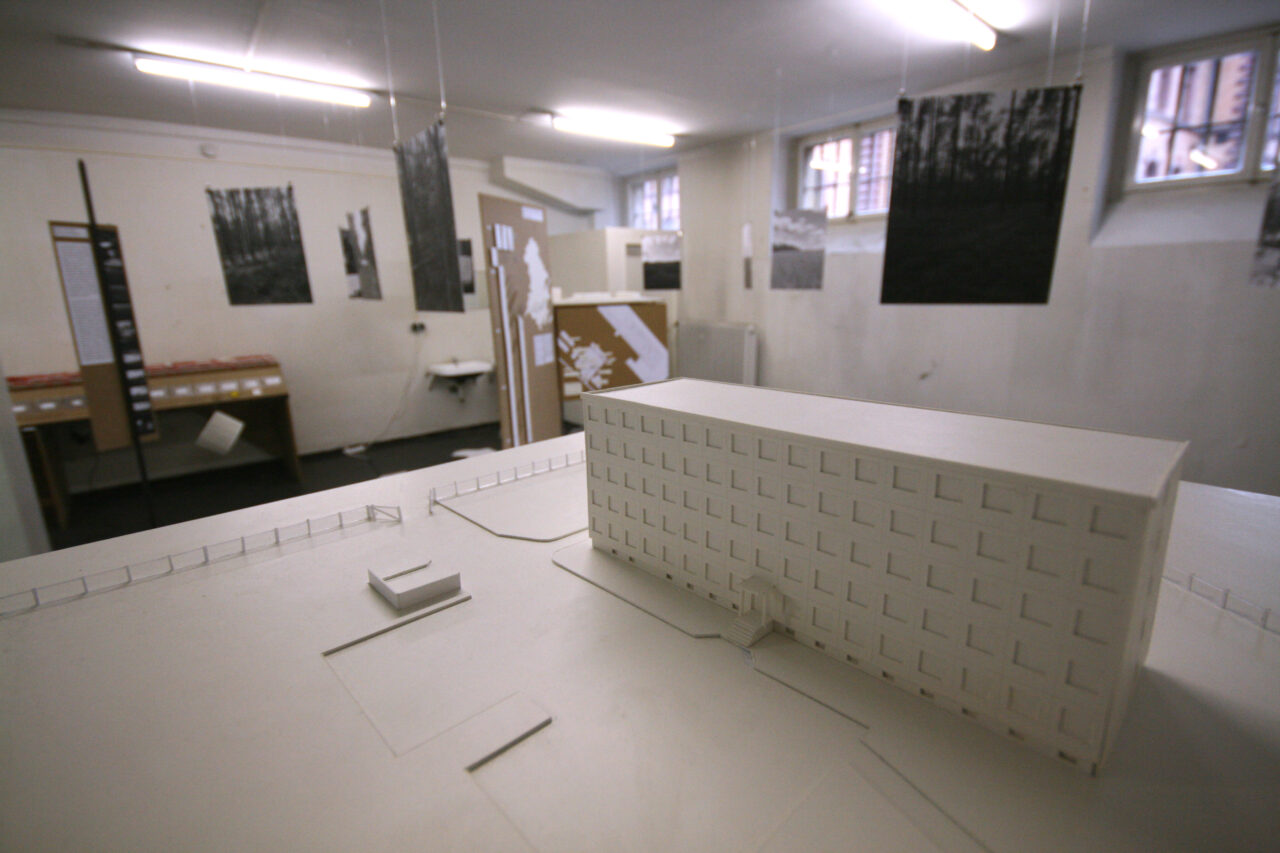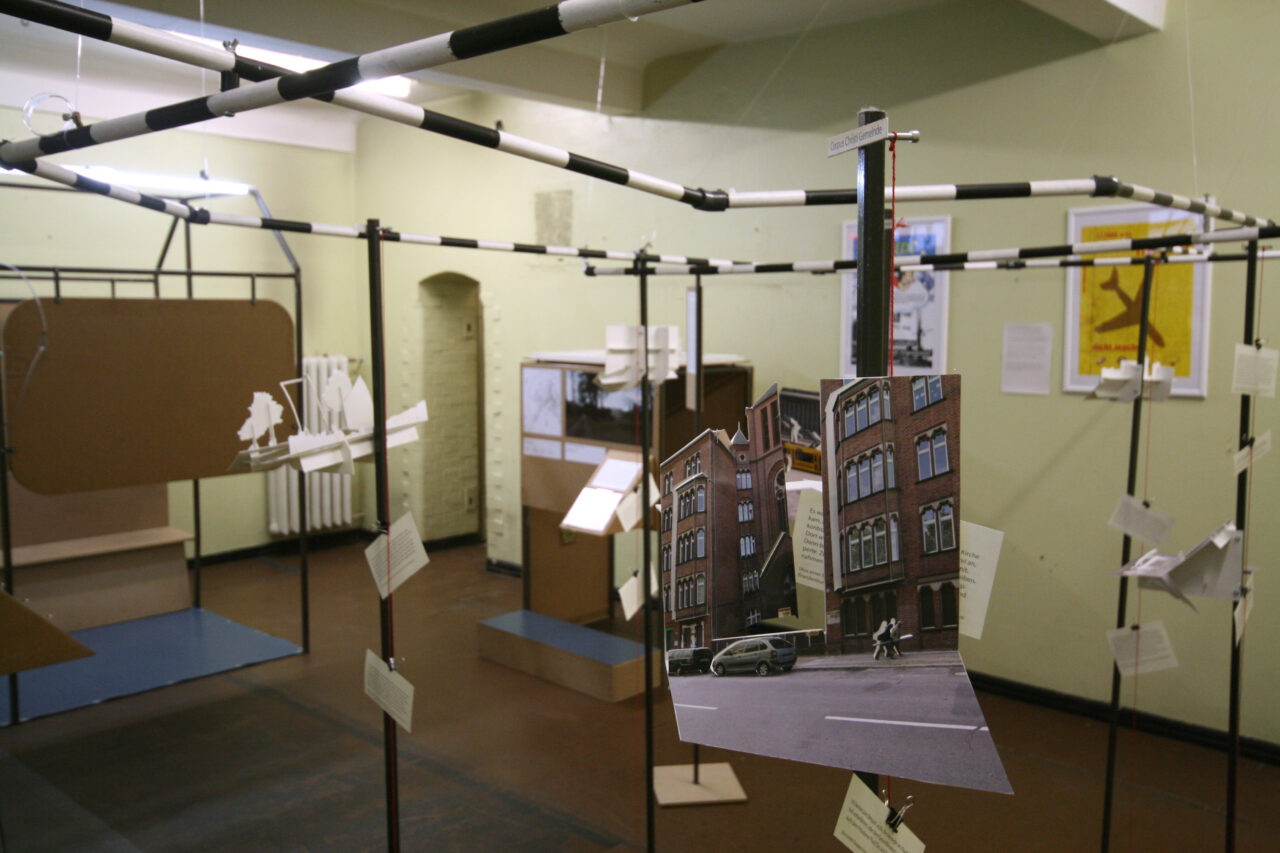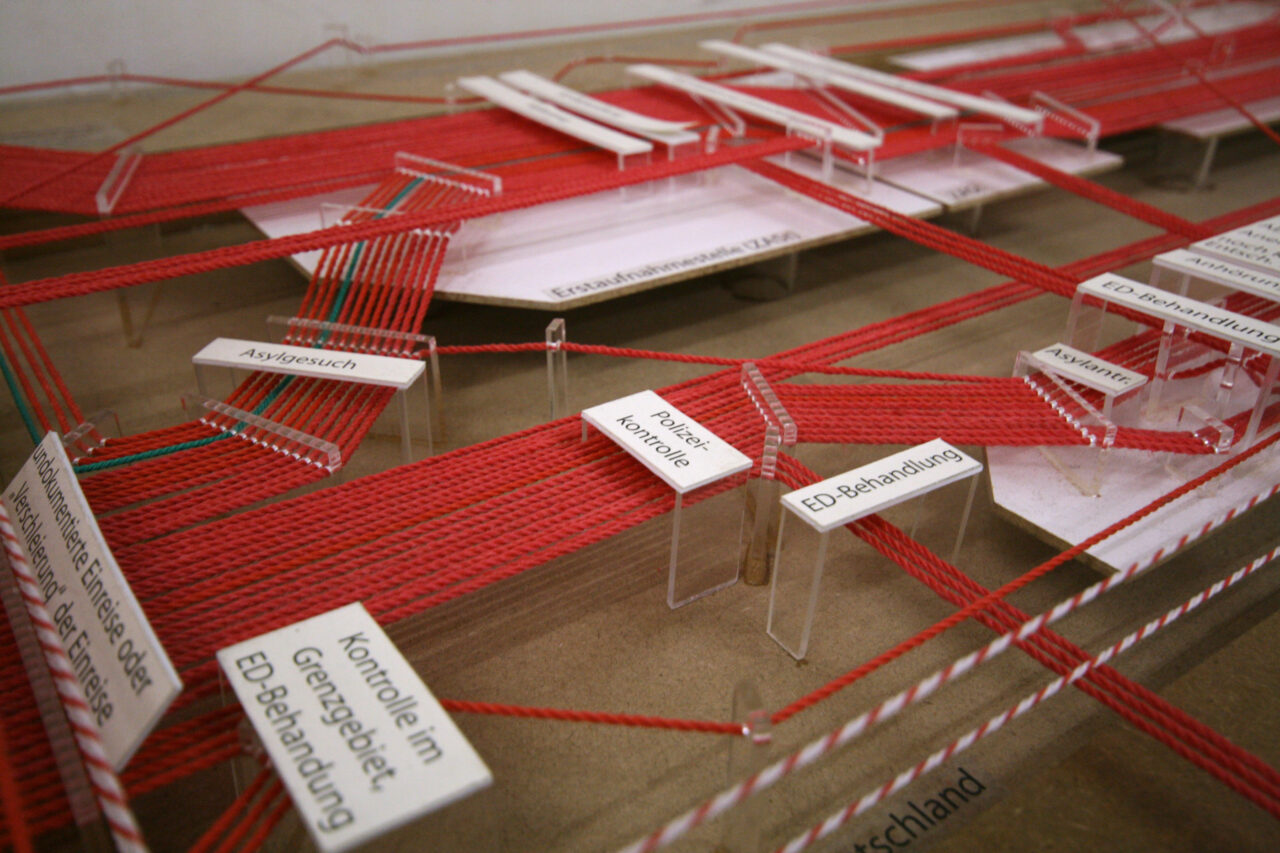5 February – 24 February 2011
Refugees, while they are either in the asylum process or live in Germany with a so-called ‘Duldung’, are facing invisible borders in their everyday life. For example they are only allowed to move within a certain area due to the ‘Residenzpflicht’ (‘duty of residence’). At the same time they are forced to live in refugee homes or camps, that are often at the edge or outside of regular settlement areas.
Voucher systems instead of cash benefits, but also police controls in train stations and trains targeting people who look ‘foreign’, stigmatise refugees and intensify their social isolation.
Utilising models, plans, texts, photographs and a short film the exhibition ›Residenzpflicht — Invisible Borders‹ documents the resulting geography of multiple inclusion and exclusion, its impact on the perception of space, but also strategies of resistance.
Exhibition website: www.invisibleborders.de



Accompanying programme
Saturday, 5 February 2011
3 p.m. // Opening of the exhibition »Residenzpflicht – Invisible Borders« by »Faites votre jeu!« and the group »No Border Ffm«.
Sunday, 6 February 2011
7 p.m. // Rex Osa, an activist from The Voice Refugee Forum, speaks about the repression against refugees and asylum seekers in the FRG and the necessity of resistance until the abolition of racist special laws like the Residenzpflicht.
Wednesday, 9 February 2011
7.30 p.m. // »Residenzpflicht – Innerdeutsche Grenzen im europäischen Kontext« The lecture by Kasm Cesmedi first provides an introduction to the topic of the Residenzpflicht from a personal perspective. As a Roma from the former Yugoslavia and a long-time tolerated refugee, he was acutely threatened with deportation from 1992 to 2007. Because of the residence obligation, he was unable to apply to his desired university after graduating from high school. Visiting his family always involved a lot of bureaucracy – spontaneous visits failed not least because of the costs involved in obtaining permission.
In his many years of work with and for Roma from the former Yugoslavia, he is aware of numerous examples through which many tolerated Roma were criminalised by the authorities for violating their obligation to reside. In addition, he offers insight into the life of a tolerated refugee – with all its harassment, permanent uncertainty and fear of deportation. Using the example of Action 302 in Münster Westphalia and the self-organisation of Roma youth within the framework of the national Roma youth network, he will refer to Roma living in Germany for many years who are acutely affected by deportation to Kosovo and discuss their attempts to make their voices heard in politics and society and to demand a say in their concerns.
Kasm Cesmedi studies Politics & Economics, History and Islamic Studies at the Goethe University, works as a mother-tongue teacher in the project »Vocational Training, School Qualification and Gainful Employment« for Roma youth and in the Roma adult education of the Förderverein Roma e.V. (www.foerdervereinroma.de), is active in national and international Roma youth networking and has helped to organise Action 302 (against the deportation of 302 Roma from Münster; www.aktion302.de).
Wednesday, 16 February 2011
7.30 p.m. // »Asylum seekers on the run in Europe – current developments on the Dublin II Regulation« Lecture and discussion by and with Maria Bethke and Dominik Bender. Both are full-time counsellors for refugees.
Saturday, 19 February 2011
8 p.m. // »Journey of No Return – End of the Line Frankfurt Airport« Film about the Sudanese refugee Aamir Ageeb, who was to be deported on board a Lufthansa plane in 1999, resisted and was suffocated by BGS officials. The director Güclü Yaman will be present at the screening. Information about the film at: www.journeyofnoreturn.com
Wednesday, 23 February 2011
8 p.m. // »Residenzpflicht und Bleiberecht aus Perspektive eines Betroffenen« Hassan Khateeb, active with Youth without Borders (www.jogspace.net), reports on the insanity of German regulations on the right to stay. He and his family were tolerated for 17 years and permanently threatened with deportation, only in October 2010 they got a right of residence.
Thursday, 24 February 2011
8 p.m. // »The European Border Management Agency FRONTEX and the Southern External Borders of the EU – Analysis of Nautilus‘ Joint Operations« Lecture by Sebastian Schaurer & Fabian Wagner. In cooperation with the research project »Staatsprojekt Europa« (lit. State Project Europe, www.staatsprojekt-europa.eu).
Frontex, the European Agency for the Management of Operational Cooperation at the External Borders, conducted operations called Nautilus in the central Mediterranean Sea in 2006-2009. The main objective of these missions was to prevent migrants from entering Europe or, if this was not possible, to deport them to their »countries of origin«. Several times, these missions were declared a failure by officials, but were continued shortly afterwards. In 2010, the operations were discontinued due to political disputes between Frontex, Malta and Italy.
In our lecture we will show that the Frontex »success story« has begun to show cracks, but that there is nevertheless no reason to rejoice. But why has Nautilus really failed and is Frontex now giving up its engagement in the Mediterranean? We will try to clarify these and other questions. After our input, we would be happy about a lively discussion.
Sebastian Schaurer holds a degree in political science and studied political science at Goethe University in Frankfurt until the beginning of 2011, with a minor in sociology and social psychology. Fabian Wagner is doing his doctorate in the »State Project Europe« at the Institute for Social Research on the border protection agency Frontex.
Reporting (german language)
- Asyl-Ausstellung im Klapperfeld (03.02.2011; www.journal-frankfurt.de)
- Aufenthalt im Nirgendwo (16.02.2011; Frankfurter Rundschau)
Press releases (german language)
- 26.01.2011 – Wanderausstellung »Residenzpflicht – Invisible Borders« vom 5. bis zum 24. Februar im Klapperfeld
- 07.02.2011 – Erfolgreiche Eröffnung der Ausstellung »Residenzpflicht – Invisible Borders« / Begleitprogramm hat begonnen